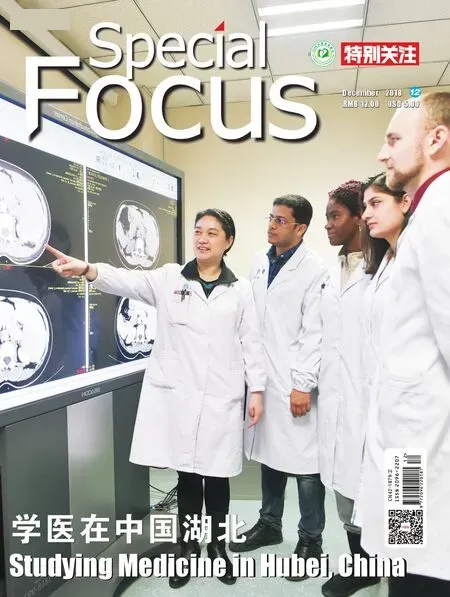Doctors Seldom Sell Dreams
By Xu Yunyun
Afamily member of my friend was suspected of having cancer and went to Beijing to see an expert in the field. As a local, I accompanied them to the hospital.
We waited for a day before the patient could finally sit in front of the top doctor in the field, who was kind and patient. The expert examined him by asking his conditions, conducting a medical analysis, and drawing diagrams on a piece of paper to help him understand his illness. The results indicated the possibility of cancer, which could enter into two categories, each with different treatment.
Therefore, further tests had to be done. There are two testing methods: One is to cooperate with other relevant departments to examine him with the help of some drugs and other methods.If that doesn't work, a second testing method would be adopted,which involves a higher risk.When the test results come back,there are solutions proposed for either type of the cancer,respectively. Of course, both types of solutions may come with different complications and corresponding after effects, which are labeled as A, B, C, D, etc.
The doctor's explanations are complicated and detailed,yet with clear logic, which is easy to understand, even for the overwhelming and distraught family members of the patient.
At the end of the consultation,I put forward my question: “If the cooperative test doesn't work out (when the family wants to keep the patient from knowing his fatal disease in case of a possible emotional breakdown),is it possible to conduct some experimental treatments? If the experimental treatment proves effective, it can relieve the patient's symptoms and prepare him for further tests, while it can help identify the type of tumor.
The doctor replied frankly:“In general, we don't do this. We must go step by step. You are a doctor yourself, so if you fully understand what it means and are willing to bear with the worst possible consequences, I'll leave it with you to make your own decisions.”
People all have expectations,which might be unrealistic sometimes, yet we still hope them to come true. Unfortunately,dreams are not something doctors offer. Doctors provide practical and feasible solutions, which in many cases might not be able to meet up with the patient's expectations. For someone who's trying to grasp the last straw, can he or she accept whatever comes with calmness?
People say doctors are too rational, but that's because we understand how far science can go and how difficult the path is.We all love to see a happy ending,which is sometimes possible,yet not always the case. Even couples determined to spend the rest of their lives together on their wedding day might end up divorced. So all we need to do is to calmly accept the “best possible solution” and put it into good implementation, which is better than waiting for an unrealistic fantasy. As the saying goes, the moon in the water and flower in the mirror cannot become real after all.
(From City Express.Translation: Lu Qiongyao)
医生那儿没梦想
文/徐蕴芸
朋友的亲人被怀疑得了癌症,来北京请专家看看,我作陪。
他提前一天排队,找了一位国内顶尖的专家,专家非常慈祥耐心。先问病情,再做分析,边说边在病历本上画图示意:从目前结果来看,有可能就是癌症,但是,这种癌症分为两类,处理方法不同,必须做检查明确;检查也分两种,可以请其他科室协助用一些药物和方法来配合检查,实在配合不了,也可以换另一种检查方法,不过,风险略微高一些;获得检查结果后,两类癌症都有经典解决方案,当然,两种方案存在各自的一些并发症,注意事项是甲、乙、丙、丁……层层深入、逻辑清楚,即使是焦头烂额、心乱如麻的癌症患者家属,也能完全明白。

最后我问,如果检查实在配合不了(因为家属想对患者隐瞒病情),是否可以先进行试验性治疗?如果治疗有效,既能缓解病情实施检查,又能反证肿瘤类型。
医生坦率地说:“一般来说,不可以这样做,我们必须一步一步走下去。你也是医生,如果完全明白其中的关系,并且愿意承担可能最坏的后果,你要怎么做,我就不再过问了。”
每个人都有一种期盼,有些时候,这是不切实际的,我们还是希望梦想成真。可惜我们从医生那儿不会得到梦想,只会得到一个现实的可操作的方案,医生的“最佳”和病人的“最佳”之间,总有落差,企图抓住最后一根稻草的求医者,是否能够冷静地接受这结局?
都说医生太理性,因为我们太明白科学走了多远,路途又有多艰险。皆大欢喜谁不爱?大团圆不是不可能,但是,不能惠及所有人,就好像手牵手说白头偕老的各位,也有劳燕分飞的,我们要做的只是冷静接受“最佳解决方案”,并将它完美实施,好过等待心中幻想的那一个水中月、镜中花。
(摘自《城市快报》)

